|
Cry Monrovia
by Chris Hondros
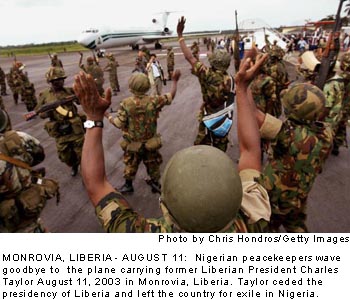 Monday
was a day of horrors in Monrovia. A massive artillery barrage was unloosed
Liberia’s capital city, artillery shell death falling from the
sky and killing anyone in the blast range when they landed. Journalists
in the press hotel were huddled in the lobby, wondering how to cover
this barrage, when the story came to us--a shattering boom, right outside.
Everyone ducked, and eventually I ventured out to see
a terrible sight—a boy, around 10, slowly dying in front of me,
his last gasps rasping as he laid prone on the ground, a pool of thick
blood spreading from his head, killed for the crime of trying to bring
a load of cassava leaves back to his family. The cassava leaves sat
beside him in the red dirt. Monday
was a day of horrors in Monrovia. A massive artillery barrage was unloosed
Liberia’s capital city, artillery shell death falling from the
sky and killing anyone in the blast range when they landed. Journalists
in the press hotel were huddled in the lobby, wondering how to cover
this barrage, when the story came to us--a shattering boom, right outside.
Everyone ducked, and eventually I ventured out to see
a terrible sight—a boy, around 10, slowly dying in front of me,
his last gasps rasping as he laid prone on the ground, a pool of thick
blood spreading from his head, killed for the crime of trying to bring
a load of cassava leaves back to his family. The cassava leaves sat
beside him in the red dirt.
I walked away from that tragic scene
just as another shell hit, this time across the street in a small school
compound about fifty yards away. Everyone scattered. It was chaos. I
ducked inside a concrete guard shack at the gate of the hotel, wondering
what I should do, as the barrage seemed endless. Finally I screwed up
enough courage to run the 50 yards to the door of the school. I wandered
in.
It was a vision of hell—wailing
children and women, crying men, blood, horror, fear. The shell had landed
in the middle of an interior courtyard, and it had directly hit a woman,
who’s mangled and lifeless body lay in the center of a radiating
blast pattern. The wounded and dead were everywhere.
I took a few pictures, but then realized
that no one was handling anything--that five minutes before, a mortar
round had landed here, and that the survivors were too dazed to do anything
at all. I was the first to arrive.
Do enough conflict zone photojournalism,
and eventually you grow accustomed to seeing the horrors of war. Though
usually, in even the worst tragedies, journalists have little role to
play other than in doing their documenting and reporting—aid workers,
soldiers, and locals do all the actual heavy lifting of saving and feeding.
But occasionally something happens that requires intervention.
“Is anyone doing anything
here? You need to get these people to the MSF clinic down the street,”
I said, loudly but to no one in particular. Dazed looks.
“MSF? You know MSF?”
Suddenly I realized that a lot of people might be half deaf from the
blast.
"Look, you two," I shouted to a pair of burly Liberians standing
by a wall in a daze, inconsolable but unhurt. "The wounded need
to be carried to the MSF clinic. Now!"
They said nothing for a moment, then snapped out of their reverie.
"But we have no car," one finally wailed.
"It's right down the street! Small small," I said, using the
Liberian slang to say something is close by. "Like this boy,"--I
motioned to a child with searing cut across his head--"and that
man there. Come on! Carry them!"
For a few minutes we went on like this, me playing triage coordinator
for this very small and macabre scene in the world’s ongoing tragedy
(or farce) of war. They made a move for the woman who'd been directly
hit, but I stopped them.
"Not her, she's dead," I said. "First the living people."
They passed over her motionless body and went on to tend a boy whose
leg had been perforated. Then many others, with a ghastly array of punctures,
amputations, and wounds. One by one the injured were carried out to
the MSF clinic a hundred meters away. Finally they were finished. We
huddled down inside their little shanty with dozens of others, fearing
another mortar strike on the courtyard.
"There is still the woman," one said.
"She's dead, I told you," I said.
He seemed confused. "But look," he said simply, motioning
to her through the window. And outside, the woman, who'd been directly
hit by a mortar shell and nearly sheared in two, was attempting to sit
up off the pavement. My head lolled down onto my chest in despair.
"Good God!" I muttered, and we ran outside. She was conscious
and moaning. Someone rolled over a wheel barrel, and we picked her up
and plopped her in. One of her feet, sickeningly hanging on by a flap
of skin, hung over the edge of the barrel, which was slowly filling
with blood.
After this, I walked back across the street to the hotel. The streets
were empty, as the shells were still striking in the distance and another
could land anywhere at any moment, but I was too spent to run. Lethargically,
I ambled up to the guard shack in front. The Liberian local militiamen
who patrol the hotel had watched the shell hit and the bodies emerge,
one by one.
I sat down, glassy-eyed and dazed. But they had no sympathy, only scorn.
"You see Liberia, white man? You see how we live?" I was mute
and communicated only with my eyes, like I'd just run a marathon. Then,
shaking my head, I walked up the hill to the hotel. Dozens of Liberians
and journalists were huddled against the walls of the dark, ground floor
lobby, like a huge litter of kittens in a tiny box.
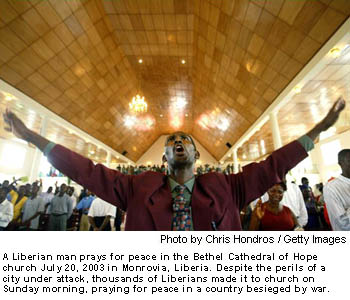 No
one, it seems, wants to make the first move to help Liberia. No
one, it seems, wants to make the first move to help Liberia.
Americans least of all want to take any initiative. The cautionary tale
of Somalia is often trotted out, but you might as well discuss the parallels
to the Liberian conflict and the Revolutionary War. Somalia is an utterly
lawless land, full of Muslims with few ties to the West and where seemingly
every household is armed to the teeth and ready to fight. Liberia’s
population tilted much more to the West. Most Liberians are benign and
surprisingly well educated, with even refugee children in rags carefully
spelling out their names when you ask. Most different of all is that
Liberians are generally unarmed and are universally weary of war.
I had many versions of this conversation:
"What do you want to happen now in
Liberia?" I would ask.
"We want American troops to come and save us."
"If they come, they will probably send a small, peacekeeping force."
"They are welcome. But better will be a large number of soldiers."
"How long would you want them to stay?"
"Many years, if they like. We are tired of war. We want occupation.
We need
help. Even a small number of Americans will command respect."
Not a single person I talked to, from
refugee to businessman to teenaged soldier nervously fingering his Kalishnikov,
was against U.S. peacekeepers occupying Liberia.
It’s apparent to anyone who visits
that Liberia considers itself an annex of
the United States--the Puerto Rico of West Africa. Founded by former
American slaves in the 1800s, a significant segment of the population
is of American ancestry. The clues of its history--and its hopes for
the future--are
everywhere, from the Liberian dollar, which was tied to the value of
the
U.S. dollar until 1996, to the American flag bandanas sported on the
head of
many a child soldier. Around the country, neighborhoods and counties
have names like Virginia, Maryland, New Georgia, and West Point. The
government complex is called Capitol Hill. The main hospital is called
the JFK Medical Center. A high school is named after Richard M. Nixon,
which is so strange I’ve been too scared to ask anyone exactly
why. Even the Liberian flag is a direct knock-off of the U.S. flag,
so close that when they hang limply they are hard to tell apart.
Reminders of America’s ties to
Liberia are literally written on the walls and signs of Monrovia. In
one common billboard, a white hand and a black hand clinch in a handshake
and their sleeves run into the American and Liberian flags. (Under the
graphic it reads, optimistically, "For Peace and Harmony.")
In another, a small Liberian boy stands on a road talking with a tall
black Uncle Sam:
"We’ve come a long way, Big Brother, but it’s still
rough!. We are
suffering!" says the Liberian, his hand outstretched.
"For true?" answers the little balloon over Uncle Sam¹s
head, probably the
first time he’s used that particular locution of English.
Eternally expecting help from "Big
Brother" however--and eternally being
disappointed--takes its toll. The locals are getting restless. In one
of the hundreds of refugee camps that have sprouted up on the literal
roadsides since LURD encircled the capital, I met a man slumped in a
plastic tent, his only possessions being a tin can
used to burn coal for cooking and a thin reed mat. We talked about the
U.S. assessment team and whether or not he thought they’d find
the evidence they needed to recommend a military intervention. His answer
summed up the feelings of almost everyone I met. "We are dying
here, every day,” he said, tears welling in his eyes. “What
more to do they need to know?
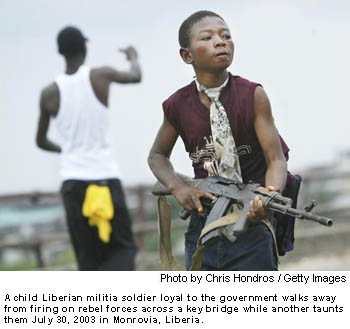 It's
especially difficult to watch such gruesome devastation every day when
you know at least a short-term solution is easy. Five hundred Marines
in one of the vaunted Expeditionary Forces with helicopter support could
probably demolish rebel and government troops alike and would have Monrovia
secured in a matter of days. It's heartbreakingly sad to follow the
travails of a multi-billion dollar, 150,000 strong soldier attempt to
occupy a clearly reluctant Iraq, while another land, much closer to
America in history and culture, has to literally beg to be occupied
with the number of American troops that pull kitchen duty every day
in Baghdad. It's
especially difficult to watch such gruesome devastation every day when
you know at least a short-term solution is easy. Five hundred Marines
in one of the vaunted Expeditionary Forces with helicopter support could
probably demolish rebel and government troops alike and would have Monrovia
secured in a matter of days. It's heartbreakingly sad to follow the
travails of a multi-billion dollar, 150,000 strong soldier attempt to
occupy a clearly reluctant Iraq, while another land, much closer to
America in history and culture, has to literally beg to be occupied
with the number of American troops that pull kitchen duty every day
in Baghdad.
But for weeks now no one has been willing
to make any first moves, so Monrovians have had to endure hunger from
cut off food supplies, death from medieval diseases like cholera, refugee
camps, and stray bullets zipping all over town, cutting people down
every day. Most feared of all is the mortar barrages, death from the
sky that rains down once or day or so, randomly killing anything unlucky
enough to be nearby when they explode. These mortar fusillades, probably
more than anything, chased out about half of the press.
This latest assault was the third such
attack in two months, and this one is by far the worst. The anti-Taylor
forces of a group called Liberians United For Reconciliation and Democracy
have been waging fierce battles at the edge of town, mobilizing the
city’s dubious pro-Taylor government soldiers and militiamen,
whose only qualifications to fight are that they’re old enough
to lift a weapon. (Sometimes even that isn’t the case.)
But some of us journalists stayed,
wisely or no. There's an element of messianic here--politicians may
talk doublespeak and advisors might dither, but someone has to be around
to show the grim realities of life on the ground in Monrovia. Every
day this drags on, seemingly needlessly, dozens more people die—and
whether its preventable or not, people need to see it. No one’s
going to come out of this and complain, Rwanda-style, of not having
known. The facts on the ground at least are clear. Ultimately that’s
all the press can do.
© Chris Hondros
Hondros@aol.com
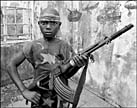 To
view the atrocities attributed to Charles Taylor's forces in Sierra
Leone, go to Martin Leuders' feature story at http://www.digitaljournalist.org/issue9902/diary1.htm To
view the atrocities attributed to Charles Taylor's forces in Sierra
Leone, go to Martin Leuders' feature story at http://www.digitaljournalist.org/issue9902/diary1.htm
|
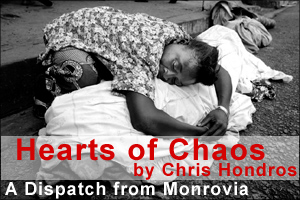
 M
M No
one, it seems, wants to make the first move to help Liberia.
No
one, it seems, wants to make the first move to help Liberia.  It's
especially difficult to watch such gruesome devastation every day when
you know at least a short-term solution is easy. Five hundred Marines
in one of the vaunted Expeditionary Forces with helicopter support could
probably demolish rebel and government troops alike and would have Monrovia
secured in a matter of days. It's heartbreakingly sad to follow the
travails of a multi-billion dollar, 150,000 strong soldier attempt to
occupy a clearly reluctant Iraq, while another land, much closer to
America in history and culture, has to literally beg to be occupied
with the number of American troops that pull kitchen duty every day
in Baghdad.
It's
especially difficult to watch such gruesome devastation every day when
you know at least a short-term solution is easy. Five hundred Marines
in one of the vaunted Expeditionary Forces with helicopter support could
probably demolish rebel and government troops alike and would have Monrovia
secured in a matter of days. It's heartbreakingly sad to follow the
travails of a multi-billion dollar, 150,000 strong soldier attempt to
occupy a clearly reluctant Iraq, while another land, much closer to
America in history and culture, has to literally beg to be occupied
with the number of American troops that pull kitchen duty every day
in Baghdad.